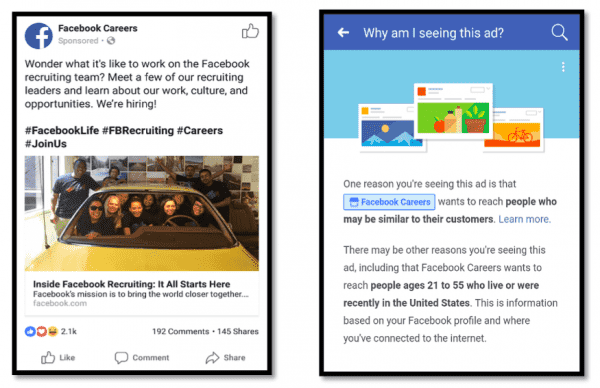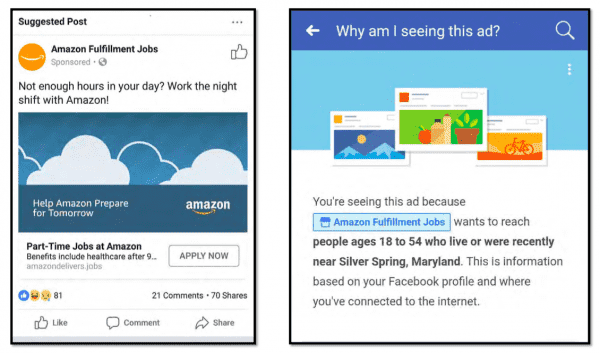
Older workers are accusing Facebook, Ikea, and hundreds of other companies for discriminating against job seekers in their 50s and 60s through targeted job ads posted on Facebook.
The Communications Workers of America, a labor union representing 700,000 media workers across the country, added the companies to a class-action lawsuit on Tuesday, which was filed in California federal court in December. In its original complaint, the labor union accused Amazon, T-Mobile, and Cox Media Group of doing the same thing.
The case, Bradley v. T-Mobile, has major implications for US employers, who routinely buy job ads on Facebook to reach users. The plaintiffs argue that Amazon, T-Mobile, Ikea, Facebook, and hundreds of other companies target the ads so they are only seen by younger Facebook users.
The lawsuit revolves around Facebook’s unique business model, which lets advertisers micro-target the network’s users based on their interests, city, age, and other demographic information. In the past, equal rights advocates have sued Facebook for accepting ads that discriminate against consumers based on their religion, race, and gender.
Facebook has argued that the company is not legally responsible when other companies buy ads that violate the law. But in a new filing, the CWA has now added Facebook to its complaint as one of the companies accused of violating civil rights laws by targeting its own job ads to younger users.
Here is one ad Facebook posted, submitted by the plaintiffs, inviting users to a career fair with Facebook recruiters. The ads were visible only to users between the ages of 21 and 55:

Facebook has denied that these kinds of ads are a form of age discrimination. Rob Goldman, Facebook’s VP of ads, compared it to posting job ads in magazines geared for young audiences, which the courts have said isn’t inherently a form of age discrimination as long as the company is also posting job ads in media outlets with older audiences or making other recruitment efforts.
“What matters is that marketing is broadly based and inclusive, not simply focused on a particular age group. In addition, certain employers want to attract retirees or recruit for jobs with specific age restrictions like the military or airline pilots,” Goldman wrote in December in response to the original lawsuit and to the ProPublica and New York Times investigation that described the widespread practice.
Facebook came under fire in 2016 when a separate ProPublica investigation showed that companies could buy ads that screened out users based on their race, which is potentially illegal in the context of housing and employment advertising. Facebook announced in February 2017 that it had developed a new system to flag and reject certain ads that screened users based on “ethnic affinity,” but the network still lets advertisers filter out characteristics linked to other protected groups: women, people with disabilities, and religious minorities.
In the age discrimination case, plaintiffs want the court to order these companies, including Facebook itself, to stop posting job ads that filter out older workers. They argue that it’s a violation of the Age Discrimination in Employment Act of 1967, which makes it illegal to discriminate against workers over the age of 40 in employment advertising, recruiting, hiring, and other employment opportunities.
Here are a few other ads the plaintiffs submitted as evidence:

The older workers are seeking an unspecified amount of damages for all of Facebook’s users over the age of 40, and for an injunction that prohibits companies from targeting job ads that exclude that group.
Age discrimination has long been a neglected issue — but that may be changing
Job discrimination against older workers is a big problem that is often overlooked in civil rights discussions. The number of age discrimination complaints submitted to the US Equal Employment Opportunity Commission (EEOC) has been rising steadily in the past 10 years, with about 18,000 complaints filed in fiscal year 2017 — about 20 percent of all complaints filed with the federal agency.
One 2017 study from economists at Tulane University and the University of California Irvine found that job applicants near retirement age, especially women, were far less likely to hear back from recruiters than younger workers. The study compared response rates to more than 40,000 fake résumés sent in applications to 135 jobs.
One of the authors, Patrick Button, an economics professor at Tulane University, testified in front of EEOC commissioners in 2017, questioning how effective federal laws have been in protecting older workers.
“While age discrimination laws seem to help mitigate some age discrimination faced by older men, older women face more age discrimination, and current age discrimination laws do a poor job of protecting older women, who are even more economically vulnerable,” he wrote.
Sourse: vox.com






